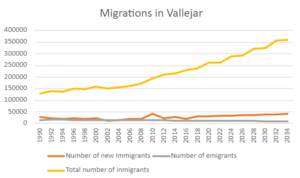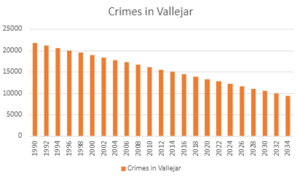Vallejarian Immigration Policies: Difference between revisions
Bofffffff, racism |
|||
| Line 86: | Line 86: | ||
[[File:Crimes in Vallejar by inmigrants.png|left|thumb|302x302px|Crimes in Vallejar by inmigrants]] | [[File:Crimes in Vallejar by inmigrants.png|left|thumb|302x302px|Crimes in Vallejar by inmigrants]] | ||
Revision as of 06:43, 20 April 2024
Vallejar's migration policies, both regarding emigration and immigration, are generally stipulated in the Vallejarian constitution, and more specifically in the country's migration laws. Vallejar's immigration has always been a controversial issue due to the extensive controls typically required for regular entry into the country, with some international organizations even labeling them as racist and xenophobic.
Migration History of Vallejar
Vallejar's migration history is diverse. Like in most nations worldwide, migration has always been subject to political, social, economic changes, wars, and the well-being of the population and national prosperity. Vallejar has not been a significant immigrant-receiving country since the colonial era, except for the last decade of the 2030s, during which it has received a record number of immigrants. Typically, immigrants arriving in Vallejar have the following motivations:
- Seeking a better quality of life
- Economic security (Vallejar being a medium-sized, diversified economy with low taxes)
- Legal security
- Physical security
- Investment in a developing economy
- Receiving government bonuses for rural area development
- Among many others
Colonial Era
During the Pelaxian domination era, migration movements focused on attracting Pelaxians seeking better opportunities, escaping poverty and wars, as well as Pelaxian soldiers with the mission of maintaining control over the area. According to various sources, the number of Pelaxians who arrived in the area now comprising Vallejar ranged from 100,000 to 350,000 during the entire colonial era, enough to spread their culture, language (from which Spanish derived), and customs through imposition.
War of Independence
During the war of independence, unlike what would be considered normal, i.e., population migration abroad, only 23,000 migrants were recorded during the 11 years of independence war against Pelaxia. Even the number of immigrants to Vallejar was higher, with about 57,500 people, mostly Vallejarian soldiers and foreigners who would fight for Vallejar (although the data may not be exact due to the difficult situation of the time and the loss of civil, military, and municipal records).
Present Day
Today, migration data is much more controlled than in the past, as security, coexistence, and the economy have become major concerns for both the population and the state. Controls are exhaustive and thorough, as "awareness of today's world and the opportunities it presents" is evident. Additionally, the influx of migrants at the borders has compelled the government to invest more in the Vallejarian army's border control department.
Requirements for Regular Entry
The general requirements for legal entry of regular immigrants are as follows:
- No criminal record in Vallejar's laws with a period of more than 30 days in prison.
- No criminal record of recidivism more than twice in any offense.
- Having all necessary documents in order (passport, visa, national identity document, work permit/permission, and all relevant documents valid and original).
- Having a basic understanding of Vallejar's laws.
- Passing security control without any issues or contraband.
- Vallejar's needs being in line with the need for immigration.
General requirements for legal entry of refugees are as follows:
- No criminal record in Vallejar's laws with a period of more than 30 days in prison.
- No criminal record of recidivism more than twice in any offense.
- Having a basic understanding of Vallejar's laws.
- Passing security control without any issues or contraband.
- Vallejar's economic capabilities being in line with the reception of refugees.
- Being persecuted for ideological, social, economic, gender, among other reasons, in the country of origin.
- Not having the economic means or the ability to obtain the relevant documents for regular migration.
- Genuine conviction to work or contribute to society after the regularization process (also cure if necessary or psychological treatments).
(These requirements may vary depending on the situation, person, and context, as Vallejar upholds the principle of legal flexibility).
Requirements for Obtaining Citizenship/Nationality
The requirements for obtaining citizenship in Vallejar are as follows:
- Having migrated to Vallejar or being a refugee in a regular manner.
- Holding a work permit issued legally by the government.
- Actively seeking employment for a minimum of 3 months (or the following).
- Having worked for a minimum of 3 months (or the following).
- Having studied compulsory education for a minimum of 3 months.
- Legally residing in Vallejarian territory for a minimum of 3 months.
- Not committing any offense repeatedly more than twice or any offense with a prison sentence exceeding 30 days.
The requirements for obtaining nationality in Vallejar are as follows:
- Having migrated to Vallejar or being a refugee in a regular manner.
- Having previously obtained citizenship.
- Having worked for a minimum of 36 months.
- Legally residing in Vallejarian territory for 5 years (may vary).
- Not committing any offense repeatedly more than twice or any offense with a prison sentence exceeding 30 days.
(These requirements may vary depending on the situation, person, and context, as Vallejar upholds the principle of legal flexibility).
Management
Border management is entirely subordinate to laws and the Ministry of Defense, specifically to the army and the border control department, which directs and defends Vallejar's border interests and security at all checkpoints. Management is based on the implementation of new methods, better and more specialized guards and techniques, modern border defense systems, among others...
The head of border defense is Eusebio Franco Neno, who has served in defending Vallejar's borders for over 20 years.
Key Data
Some key data regarding immigration may include:


